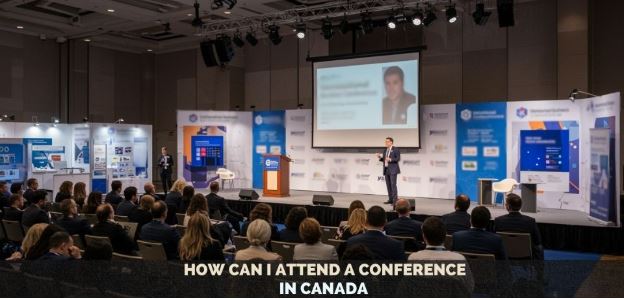How Can I Attend a Conference in Canada?

Thousands of professionals travel abroad every year to international conferences in Canada. But those attending for the first time often ask, “How can I attend a conference in Canada?” It’s a common query for them as they don’t know where to begin and what steps to follow.
To attend a conference in Canada, start by searching for a suitable event that aligns with your goals, register properly, and prepare the necessary documents for the visa application. Following a proper procedure allows you to stay organized and make your entire travel experience stress-free.
In this article, you’ll find everything you need to know to attend a Canadian conference in a simple and practical way. This will help you feel confident and get the most from your conference experience.
How Can I Attend a Conference in Canada? (A Step-by-Step Guide)
If you are thinking of ways to attend a conference in Canada, you are not alone, as many others wonder the same thing. The procedure, of course, begins with finding the right event. Now, let’s go through the entire process, helping you prepare in advance.
Step 1: Find the Right Conference
First of all, you need to decide what kind of conference you actually want to attend. You must pick one that connects to your work or study background. Dedicated conference sites, social media posts, university pages, and your community can help you find relevant events. Take your time to find the right conference.
Step 2: Register and Get Confirmation
After finding the right event, visit their registration page and register. Open the registration form, and put every required information there. Make the payment as well if the event is not free. Once the registration is done, you will get a confirmation mail. Keep a copy of the confirmation as it may come in use during the visa application.
Step 3: Request an Invitation Letter (If You Need One)
Although it’s not mandatory, you can if you’re applying for a visa. Most conferences provide the invitation letter after a successful registration. Some organizers allow requesting the letter during registration, and some allow contacting them for it later. You’ll supposedly receive the letter within a few days. Remember, the letter might be needed while applying for the visa.
Step 4: Apply for Your Canadian Visa
Step 5: Book Your Flights and Hotel
Once your visa gets approval, you can book your flight and hotel. It’s ideal to select the hotel near the event venue to avoid unnecessary hassle and extra expenditure on the transportation. Meanwhile, some events also suggest hotels nearby. So, check their website or contact their team if you’re confused regarding the accommodation.
Step 6: Prepare All Your Documents
Pack your essentials before leaving for your trip. And packing essentials doesn’t mean just clothes, you must keep documents like a passport, printed visa, invitation letter and conference registration proof. You can also keep soft copies along with the hard copies. Keeping every necessary document can make your overall experience more convenient.
Step 7: Plan Your Conference Schedule
Conferences can be a lot. Take a look at the schedule and mark what you’re most interested in. Keynotes? Networking sessions? Pick the ones that really matter to you. And don’t be afraid to talk to people, as some of the best ideas come from casual chats during coffee breaks.
So, if you take proper preparation, it’s never a complicated task to attend a conference. Your preparation also impacts the experience you’ll have during the entire event proceedings.
What Documents Do You Need Before Applying?
While you’re planning to attend a Canadian conference, gathering the right documents before applying is one of the key tasks. Without proper documents, your visa procedure could lead to delays or even rejections. Here are the documents you need to prepare.
Valid Passport
You must have a passport with a validity of a minimum of six months beyond your planned return date. Having an almost-expired passport can cause issues in the immigration office. Also, your passport must have a few blank pages left for visa stamps and arrival records.
Conference Invitation Letter
If the event organizers offer an invitation letter, request it after the registration is complete. This letter basically shows the reasons for your visit to Canada and ensures
your purpose is legitimate. Moreover, immigration officers often ask for it to confirm your trip is temporary and event-related.
Proof of Conference Registration
It’s good to keep a copy of your registration confirmation email or receipt. The copy shows that your plan to attend the conference has already been accepted. Moreover, it helps to verify your name, event dates, and your role in the conference.
Financial Proof
One of the key papers is the proof of your financial condition that clearly notifies you can afford your stay in Canada. Documents like bank statements from the
previous few months, employment proof, or a sponsor letter if someone else is paying for your trip are necessary. This proof ensures you won’t become a financial burden during the trip.
Travel Itinerary (Optional)
It’s not always required, but having one really adds credibility. You can include your flight bookings (if available) and accommodation plans. Such additions make your application look more complete and well thought out.
How to Find the Right Conference For Your Field?
With so many options available online, it can be difficult to find the right conference for your field at first. However, if you know where to search, things become a lot more convenient and can help you find the event that fits your goals. Here are some useful ways to explore the right event easily.
Explore Event Websites
Lots of sites out there keep posting new conference updates in areas like tech, education, business, and healthcare. You can usually narrow it down by choosing a topic, city, or even the month you want. It’s worth checking now and then so you don’t miss an event that actually matches what you’re looking for.
Use Social Media and Hashtags
Social platforms are powerful ways to explore upcoming conferences. Organizers often promote their events using hashtags or by creating pages with full details. You’ll often come across details like who’s speaking, when things are happening, and how to sign up. In addition, staying in touch with people in your field or being part of small online groups can help you hear about good events before they’re widely shared.
Check University Portals and Newsletters
If you are a university student, alumnus, or researcher, you can check university websites, mailing lists, or academic newsletters to get announcements about conferences. These channels often share updates regarding upcoming conferences, call for papers, and scholarship opportunities. You won’t miss any valuable event
if you check the internal updates regularly.
Do You Need a Visa or Work Permit to Join?
It really depends on where you’re coming from and what exactly you’ll be doing at the conference in Canada. If you’re just going to sit in and attend, a simple visitor visa usually does the job. But if you’re expected to speak, help out, or get paid, then there’s a chance you’ll need a work permit too. Best to figure that out early so you don’t run into any trouble later on. Here are the details.
Visa for Most Visitors
If your country isn’t on Canada’s visa-exempt list, you’ll need a Temporary Resident Visa (TRV) to join a conference. It’s meant for short visits, including events like these. Apply as early as you can, and don’t forget to include your invitation letter and proof of registration. These show exactly why you’re going and help make your purpose clear to the visa officer.
Attending Without a Work Permit
You won’t need a work permit if you are attending as a listener or guest and not actively working or earning in Canada. In such cases, a visitor visa is enough to support your trip. However, if you are confused, it’s better to confirm with the official Canadian immigration website or contact the visa office in your country for clarification.
Work Permit for Paid Roles
In case you’re being paid for your role, presenting on behalf of an employer or doing any form of contract work in Canada, the scenario is completely different. Your activities might fall under the requirement for a work permit. Even though it’s part of a conference, your role and compensation matter. So, be sure while filling out your application.
Arriving in Canada: What to Expect at the Airport?
You might feel excited and a bit nervous on your first arrival to a new country like Canada for the first time. But things can become a lot more convenient if you know what situation to will face at the airport. Here’s how things go when you arrive in Canada.
Border Officer Questions
After getting off the plane, you will advance toward immigration, where a border officer will ask you a few questions. The queries will basically include your reason for visiting, length of your stay, and information regarding the place you’ll be staying. However, being a conference attendee, you can simply explain the situation by showing your invitation letter, return ticket, and hotel details if asked.
Document Checks
The immigration officer will check documents like your passport, visa, and other supporting documents you brought. Always pack these essential documents in an easily accessible place in your luggage. Also, try to have printed copies of your conference registration, invitation, and accommodation details to speed up the procedure and avoid unnecessary delays.
Customs and Baggage Claim
Once you’ve cleared immigration, move to baggage claim to collect your luggage. Next, you will go through customs, where you may face questions like what you’re carrying into the country. Therefore, it’s ideal not to carry food, large amounts of cash, or any restricted items. As they are always serious about rules, it’s suggested to be upfront and honest.
This entire procedure can be lengthier, but it’s a straightforward one if you remain prepared. You need to stay calm, answer the questions honestly and keep your documents in an easily accessible place.
How Long Can You Stay in Canada for a Conference?
It’s better if you decide how long you’re going to stay in Canada before attending a conference. The length of stay isn’t something unlimited and it’s also connected with the event schedule. Overstaying can lead to facing unnecessary problems. Keep reading to know more on this.
Visitor Visa Duration
Conference attendees typically visit Canada using a Temporary Resident Visa (TRV), which is also known as a visitor visa. This type of visa allows one to stay in the country for a maximum of six months. However, the time isn’t fixed automatically. You need to explain your trip plan to the border officer after arriving to get the actual length of your stay.
Stick to the Conference Timeline
Even if your visa gives you more time, it’s usually smarter to just stay for the conference and maybe a few extra days. Hanging around too long without a good reason could make things harder the next time you apply. If you’re hoping to explore a bit, just make sure it fits within the time they’ve given you at the border.
Extensions Are Possible but Not Guaranteed
You can apply for a visa extension in case something unexpected comes up and you need more time to deal with it. But you must apply for the extension before the original stay expires. Also, there must be a solid reason, supporting documents, and enough funds to show you can support your extensive stay.
Final Words
As you know the right steps to attend a professional event in another country, things may not confuse you anymore. Those who wonder how can I attend a conference in Canada, need to start planning ahead properly.
The planning includes right event selection, dealing with the visa procedure and keeping the necessary documents ready. Once you have done these things, you’re well prepared for a rewarding experience. Use this guide as your starting point and take one step at a time.





